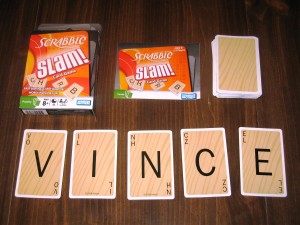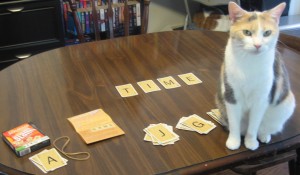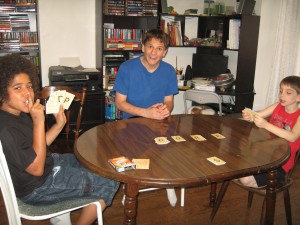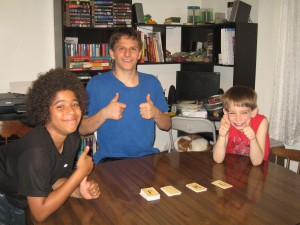I enjoy a good game of Scrabble, but sometimes I’m not able to commit to an hour of playing board games. Word on the Street, which I’ve previously reviewed, is an excellent alternative…though I came across this card game whilst browsing at my local store and figured I would give it a try.
Scrabble Slam! is a quick card game that forces players to think fast, for there are no “turns”. Players will be trying to form four-letter words (preferably the family friendly sort) with the cards they have in their hand as quickly as possible. Before I get ahead of myself, let’s take a very brief look at the components and gameplay before heading into the review.
Components
Cards: The cards are the only components in the box, not counting the manual. Each card has a large letter in the center, with two little letters on the top left hand corner of the card. The top little letter represents the letter you are currently viewing (they will match) and the second little letter indicates what is on the back of the card…this is so that you aren’t constantly having to flip cards to see what is on the other side.
Setup & Gameplay
All players start by agreeing on a four letter word and spell it out in the middle of the table, using the cards. Then, the rest of the cards are dealt to each player equally.
When players agree to begin, they all quickly try to find a letter that would replace one of the ones on the table that would still make a valid word. If the word is “FATE” for example, a player might play “M” and make the word, “FAME”. There are no turns, so players will be rushing to form words before anyone else in an attempt to get rid of all of their cards.
There are wild cards in the deck, which can be substituted for any letter. Once that letter is chosen and placed on the word, however, that wild card remains at whatever letter was chosen, just like in Scrabble.
The Review
I’m not sure if any of you have ADHD children, but those that do know how easy it is for arguments to start and tempers to flare when they compete against one another. It is for this reason that I did not particularly like the chaotic nature of the game and instead tweaked it to become a more friendly, interactive game. I introduced turns, letting one player place a card on their turn. For educational purposes, I allowed the other kids to help one of the others if they ever got stumped. If a player could not play a card, they would pass and hope that the word morphed into something more plausible when it became their turn again. The winners were those that could play all of their cards and not be stuck without a way to play them. As it turns out, all four of us managed to go out, and all of us came away happy.
While the manual does not express flexibility, I think that this game has tremendous potential to be so. I am anxious to see how the game would play out using a three-letter word or a five-letter word, for example. Choosing a new word every time will force players to flex their vocabulary muscles a bit…something that I encourage all kids to do.
All in all, the game is sound and works well for when you are on the go or don’t have a lot of time to spare. While I am sure that the chaotic nature of the core rules might appeal to some, it doesn’t work for all audiences. Luckily, the game is open enough to allow players to tweak rules and add variants as they so please…their imaginations being the limit. If you have kids and want something educational that will help them improve on their spelling and vocabulary, I’d recommend adding this cheap edition of Scrabble to your home.
Final Verdict: 6/10
—





Nice to see scrabble loving people.